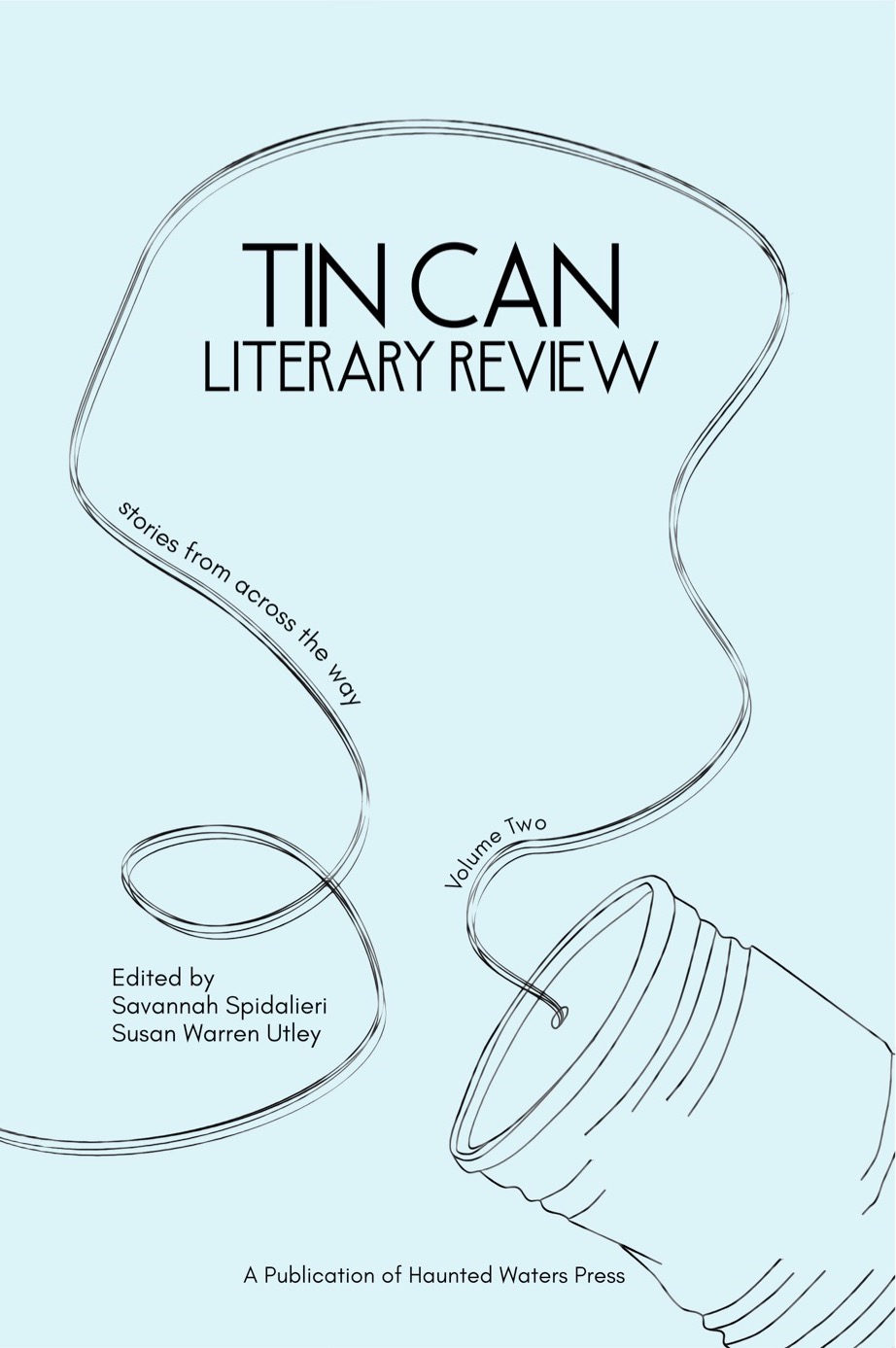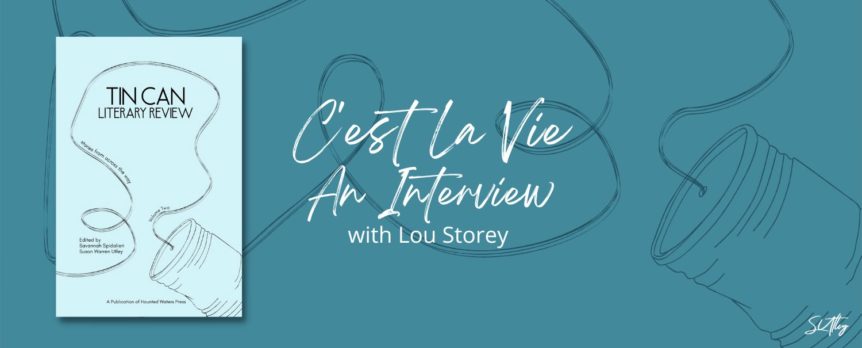An Interview with Lou Storey
Thank you for joining us for another Haunted Waters Press Featured Author Interview. In this series, we sit down with contributors to chat about their craft and explore the experiences that have shaped their writing.
Today's interview is with HWP Contributor Lou Storey. Lou's work Punch Chicken is showcased in Tin Can Literary Review, Volume Two. Enjoy!
I like the challenge in short fiction of delivering just enough information to prompt a whole world to come alive. When the thought of a story first enters my head, its configuration is more similar to short fiction than to a full-length novel. I do worry that living in the age of the sound-bite, the blurb, the elevator pitch, my attention span has been miniaturized, leaving me believing my short pieces are a full meal when they are a small plate appetizer. The joy for me in writing short fiction is greatest when the idea is new and working its way onto a page. That feeling lessens when expectation and ambition take over with the demand to make certain the words convey my intention. The joy, mixed with relief (fatigue?), returns when a reader reports back that my message was well received.
Is there a particular piece of writing or an author you feel has influenced you most as a writer?
I was inspired early in life by good storytellers, people who knew how to pull me right into their universe and create something that could domino a rapid trail right into my heart. These storytellers were writers, visual artists, composers and lyricists, screenwriters and actors, choreographers and dancers, anyone who could spin a yarn or communicate their art on a level that was enthralling. There were many influencers, but certain ones come to mind: Cy Twombly, whose mesmerizing and rule-breaking scribbles on canvas were, to a confused and intrigued kid, secret worlds waiting to be deciphered; Chubby Checker doing the twist on TV, my first example of body language and the joy of letting loose; the Orson Welles movie Citizen Kane and the tragic mystery of Rosebud that broke my innocent heart; Flannery O’Conner and the last line from Everything That Rises Must Converge—“The tide of darkness seemed to sweep him back to her, postponing from moment to moment his entry into the world of guilt and sorrow.” Reading that at age twelve left me numb with terror—would I one day do something foolish, make a mistake that would burden me forever? Each of those artists are now a part of me. My brain is a plastic Lego construction, and those artists are the foundational bricks.
"What I do allow myself is to keep writing, allow for the mistakes, allow for the shame, the exposure, and, the hardest part, allow myself to enjoy the successes and really see them as evidence against the worst of my inner critic."
—Lou Storey
Do you have any go-to books about writing or the creative process? What's on your bookshelf?
The firemen of Fahrenheit 451 would be very disappointed if they showed up at my house. My bookshelves are empty. I don’t like to keep books. Not even the books I love so much. I give them all away; donations to schools, hospitals, libraries, personal gifts, and I especially like filling up neighborhood book drops. A book does no one any good just sitting on my shelf. I have had a multitude of books suggested to me on the craft of writing. All of them are excellent. I am sure of that, but I’ve never finished any of them. I do purchase them, and I do try to take in all the good advice, but it’s like putting a leash on a cat—a struggle that always ends in defeat (not for the cat).
What is your workday like as a writer?
I have a friend who is a very successful writer. She finishes her morning coffee by nine and then sits at her keyboard until lunch at one o’clock. Some days she writes very little or even nothing at all, but she never leaves her seat. Other days she is fully committed and engaged, typing away—but only during those four hours. Not me. Whenever I can write, I do. My writer’s workday is open to any number of influences, catalysts, disruptions. I do find that I can really commit to writing on days when I should be doing something else (like cleaning or food shopping). I am in a two-husband household, so my husband and I spend a lot of time not doing things that a household needs allowing ourselves the excuse, “I don’t think that’s what a husband does.” I can only imagine what kind of terrible, lazy, no-good husbands we’d have been to a wife had the gay genes in us not activated.
Let’s talk first drafts. Do you compose on a computer, or are you a pen and paper writer?
As romantic as it would be, I am not a pen and paper writer. I have my reasons. I am left-handed. I cannot spel. When I take notes at a lecture, even when I try very hard to write clearly, the results later are a sorry mess, illegible, like a lie detector’s skittery blips scrawling down a page. In the 1960s, I took typing in high school (an elective—all the girls chose typing, the guys, except for me, chose shop). When I would type on a manual typewriter, my speed was abysmal because my fingers would get jammed between the keys (in shop I likely would have lost those fingers). I avoided writing for years. But then a miracle occurred: the computer. As a kid, I dreamed of having a perfect robot friend (someone I could boss around and still be loved). The computer is all that to me. Gives me perfect penmanship (in various fonts!), corrects my spelling, and lets me know when I have gone off the grammatical rails. Next to my husband (because he will read this), I love my computer the best. Until it fucks up, then I hate it with a passion.
Describe your editing process.
I am surprisingly docile when someone is editing my work. Even if they red-pencil something I love, something I thought was brilliant. I accept it, and not because I think they are right. I do it because I am so grateful that I don’t have to edit the piece myself. I started writing poetry in college. Loved it! For our final, we had to write an epic poem. My theme was something to do with how I experienced the years of my life, which back then were still countable. I fussed over it for a number of weeks with pages and pages of work to edit, cutting it further and further toward its essential truth. I handed in this final poem: “It was always summer/ on the beach.” I failed the course. Since then, I have learned to stop myself, but the advice, “cut the fat, not the meat,” means nothing to me—when I step into the role of editor, everything turns to fat. Working with a group of writers has helped. We share our work giving me a much-needed reality check. Setting up strict deadlines for finishing the piece has helped too, and keeps me from editing the work down to nothing.
How much of yourself do you allow to flow into your characters?
At times I can see bits and pieces of myself in the characters I create. I think what is more interesting is how clearly my biases show up in my characters. They all have strong opinions, and they are often brave in defending them, which I know gives me some cathartic thrill since I am a coward when it comes to confrontation. Of course, I steal from life, recreating people I know personally into the characters in my story. Inevitably though, I bend them and shape them according to how I see the world, a kind of filter that encompasses all my limitations in perception, so the final product ends up being more about me than the original person. Being asked, “How much of yourself do you allow to flow into your characters?” makes me wish I actually had the wherewithal to allow or not allow what percentage of me flows into them. What I do allow myself is to keep writing, allow for the mistakes, allow for the shame, the exposure, and, the hardest part, allow myself to enjoy the successes and really see them as evidence against the worst of my inner critic.
What words do you live by? Do you have a personal motto?
I was immune to mottos or words to live by until I read Viktor Frankl’s Man’s Search For Meaning. I could now rattle off an entire script of his words of wisdom. I say that with utter sincerity, no irony or glib undertone. The label of hero or genius nowadays seems offered too readily, to the point where it has become a hollow compliment, so I can only say that Frankl’s offering of a meaning-based existential view of how to live initiated in me a process of healing the wounded parts of myself that prior I had unknowingly been repeatedly re-wounding. I love how one book can change everything.
If you could tell your younger writing self anything, what would it be?
My response to this question is weird—and even weirder—it is true. In 1978 while traveling on the Market Street bus in San Francisco, an old bald man dropped down heavily on the seat next to me and proceeded to explain that he was me from the future and that I should listen carefully to everything he had to say. I was horrified. He was old, spotted, and bald—something I could not imagine ever being. He talked rapidly as if he only had a moment to convey his message. If he really was me from the future, then he must have already known that I was not listening to anything he had to say. One thing I do remember, he told me to learn French. Since then, I have told this incident to several friends, each of whom immediately asks, “So, did you learn French?” Maybe it is not too late, but no, I never got around to learning French, mostly because I had years of Spanish in school, and magically, none of it ever took. I am currently old, bald, and the spots are forming. I know I will have a lot to say to my younger self, and I know he won’t absorb a word of it. C'est la vie.
What comes next for you as a writer?
Having completed my memoir, My Acre of Moon, right when the pandemic first hit, I sent it around anyway, kind of feeling like someone on the Titanic writing a long letter while the cabin fills with water. I am now finishing up a fiction novel, The E.P.O., and sending it out to my reader group. I continue to write short pieces and am being slowly and most willingly pulled into the moody and moss-shaded beauty of my new home in Savannah, Georgia.


Lightning Round with Lou Storey

ABOUT THE AUTHOR
Lou Storey is a visual artist and retired psychotherapist living in Savannah, Georgia, with Steve, his husband of thirty years. Lou’s fiction and creative nonfiction writings have appeared in The New Yorker, New York Times Tiny Love Stories, River Teeth’s Beautiful Things, Blue Mountain Literary Review, Multiplicity Magazine, Beyond Queer Words Anthology, and in journals related to supporting creativity and mental well-being, and issues connected to LGBTQ older adults. Lou is also a featured artist in the documentary film The Creative Imperative.
Share this Post

